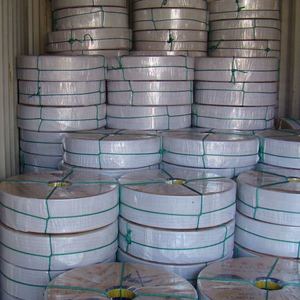(3479 products available)










































































































































































































































Farm irrigation pipe comes in various forms, sizes, and materials. Each type is designed to meet specific agricultural needs and can be produced in bulk by different farm irrigation pipe factories. Here are the different types of farm irrigation pipes a factory may produce:
PVC Pipes
Polyvinyl chloride (PVC) pipes are popular for transporting water in irrigation systems. They are lightweight, durable, and resistant to corrosion. These pipes come in different diameters and pressure ratings, making them suitable for various applications. They are usually used for sprinkler and drip irrigation systems.
LDPE Pipes
Low-density polyethylene (LDPE) pipes are flexible and lightweight. They are commonly used in drip irrigation systems. LDPE pipes are easy to install and are available in coils, reducing joints and fittings. These pipes are suitable for low-pressure irrigation systems and small-scale farms.
HDPE Pipes
High-density polyethylene (HDPE) pipes are known for their strength and durability. They are used in pressurized irrigation systems and can withstand high pressures and harsh environmental conditions. These pipes are flexible and resistant to UV rays, making them ideal for surface and subsurface irrigation systems.
Aluminum Irrigation Pipes
Aluminum pipes are lightweight and resistant to rust. They are usually used in sprinkler irrigation systems. Aluminum pipes are durable and can be easily moved from one field to another. They are also available in different diameters and can be customized to meet specific irrigation needs.
Galvanized Steel Irrigation Pipes
These pipes are made of steel coated with zinc to prevent rust and corrosion. They are strong and durable, making them suitable for high-pressure irrigation systems. However, galvanized steel pipes are heavier than other materials and may require more maintenance.
Rigid PVC Pipe
This is a non-metallic pipe used in farm irrigation systems. It is popular because of its ease of installation and lower cost. Rugged PVC pipes are used in surface irrigation systems and are resistant to corrosion.
Engineered PVC Pipe
This pipe is designed specifically for irrigation applications. It has a higher flow capacity and is more resistant to kinking and crushing. Engineered PVC pipes are used in high-pressure irrigation systems and large-scale farms.
Farm irrigation pipes are used to transport water from one area to another. These pipes have different features and functions which include:
Water is a basic need for agricultural growth, and farmers must receive it efficiently and cost-effectively. There are several scenarios where irrigation pipes are used, including:
When choosing a farm irrigation pipe factory, buyers should consider several factors to ensure they are getting quality products at competitive prices. Here are some of them:
Product Quality
Business owners should look for irrigation pipes that have been tested and certified by reputable bodies. They can request samples to examine the workmanship and materials used. Also, they can read the factory reviews and testimonials to get insights into their product quality.
Product Variety
It is important to choose a farm irrigation pipe factory that offers different types of irrigation pipes and systems. This will enable buyers to meet the various needs of their clients. More importantly, it is a good idea to choose a factory that offers additional irrigation accessories.
Factory Pricing
Business owners should compare the prices of different factories to get one that offers reasonable prices. They can also inquire about any additional costs such as shipping and handling fees. This will help them to accurately estimate the overall cost.
Production Capacity
Buyers should choose a factory that can meet their order needs within the required timeframe. They can request quotes for different order sizes to determine if the factory can handle large or small orders. It is also important to consider the lead time.
Customer Service
Great customer service is crucial when working with any supplier. Business owners should look for a farm irrigation pipe factory with a competent support team. They can test the level of customer service by sending queries and analyzing the response time and quality.
Customization Options
To meet different clients' needs and preferences, it is good to choose a factory that offers customization options. This will enable business owners to work closely with the factory in designing and producing customized irrigation solutions.
Payment Terms
Buyers should review the farm irrigation pipes factory payment terms to ensure they are favorable. They can look at the accepted payment methods and the percentage required for a deposit. Also, they can check the credit terms offered by the factory.
Q1: What factors should be considered when choosing an irrigation pipe?
A1: Farmers should consider the water source, topography, soil types, crop types, climate, and budget when choosing an irrigation system. These factors will influence the type of system and pipes suitable for the farm.
Q2: What is the lifespan of irrigation pipes?
A2: The lifespan of irrigation pipes varies by type. PVC pipes can last 25-30 years, while HDPE pipes have a lifespan of up to 50 years. However, proper installation and maintenance affect durability.
Q3: What is the maintenance routine for irrigation pipes?
A3: Regularly checking for leaks, clogs, and damages. Flushing the system to remove debris. Checking the pressure levels and ensuring they are within the recommended range. Replacing worn-out sections of the pipe. Professional inspection is also recommended.
Q4: Can irrigation pipes be recycled?
A4: Yes, irrigation pipes can be recycled. PVC and HDPE pipes are commonly recycled into other products. However, the recycling process requires proper handling of the pipes to avoid contamination from agricultural chemicals.
Q5: What are the safety standards for irrigation pipes?
A5: The safety standards for irrigation pipes include the materials used being safe for drinking water, UV resistance for surface pipes, and the pipes being durable and strong to withstand pressure and external conditions. The pipes also need to be recyclable.